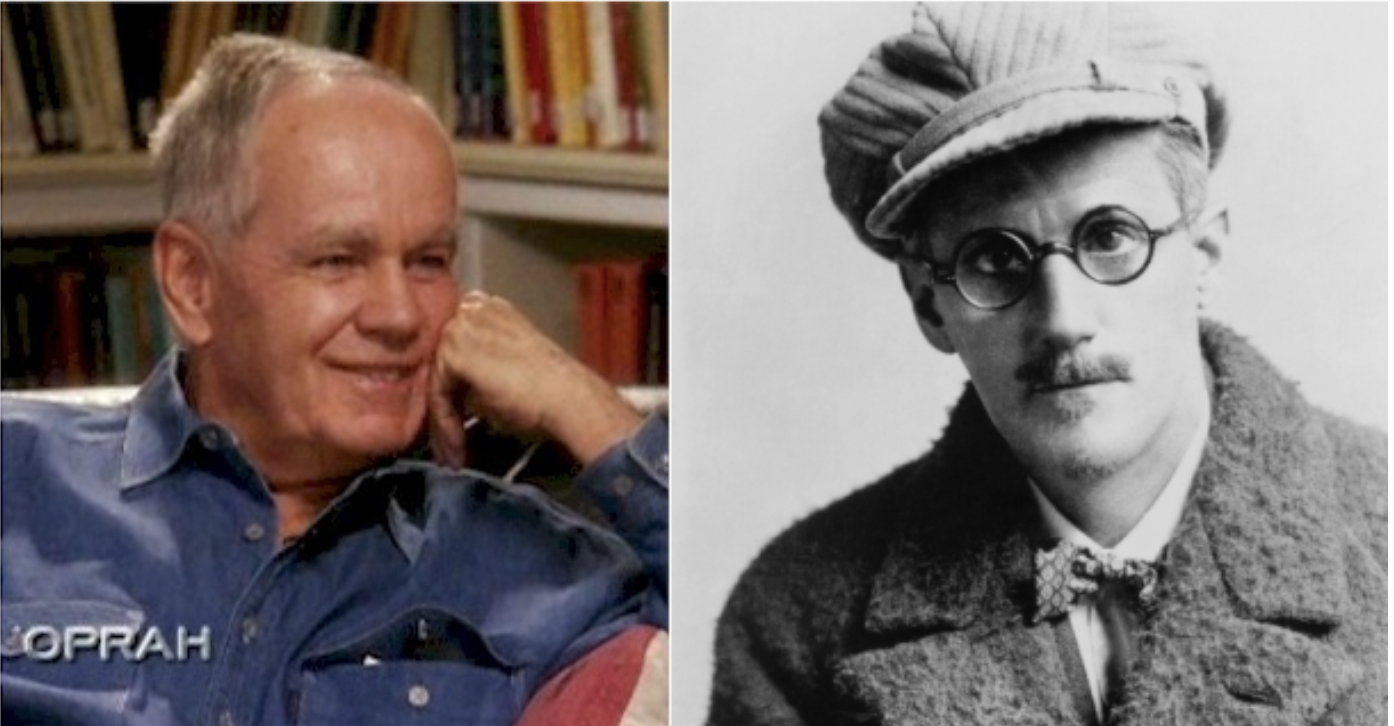
Note: Today novelist Cormac McCarthy (All the Pretty Horses, The Road and No Country for Old Men) passed away at the age of 89. Below, we’re revisiting a favorite post from our archive that focuses on punctuation, a distinctive element of McCarthy’s writing.
Cormac McCarthy has been—as one 1965 reviewer of his first novel, The Orchard Keeper, dubbed him—a “disciple of William Faulkner.” He makes admirable use of Faulknerian traits in his prose, and I’d always assumed he inherited his punctuation style from Faulkner as well. But in his very rare 2008 televised interview with Oprah Winfrey, McCarthy cites two other antecedents: James Joyce and forgotten novelist MacKinlay Kantor, whose Andersonville won the Pulitzer Prize in 1955. Joyce’s influence dominates, and in discussion of punctuation, McCarthy stresses that his minimalist approach works in the interest of maximum clarity. Speaking of Joyce, he says,
James Joyce is a good model for punctuation. He keeps it to an absolute minimum. There’s no reason to blot the page up with weird little marks. I mean, if you write properly you shouldn’t have to punctuate.
So what “weird little marks” does McCarthy allow, or not, and why? Below is a brief summary of his stated rules for punctuation:
1. Quotation Marks:
McCarthy doesn’t use ’em. In his Oprah interview, he says MacKinlay Kantor was the first writer he read who left them out. McCarthy stresses that this way of writing dialogue requires particular deliberation. Speaking of writers who have imitated him, he says, “You really have to be aware that there are no quotation marks, and write in such a way as to guide people as to who’s speaking.” Otherwise, confusion reigns.
2. Colons and semicolons:
Careful McCarthy reader Oprah says she “saw a colon once” in McCarthy’s prose, but she never encountered a semicolon. McCarthy confirms: “No semicolons.”
Of the colon, he says: “You can use a colon, if you’re getting ready to give a list of something that follows from what you just said. Like, these are the reasons.” This is a specific occasion that does not present itself often. The colon, one might say, genuflects to a very specific logical development, enumeration. McCarthy deems most other punctuation uses needless.
3. All other punctuation:
Aside from his restrictive rationing of the colon, McCarthy declares his stylistic convictions with simplicity: “I believe in periods, in capitals, in the occasional comma, and that’s it.” It’s a discipline he learned first in a college English class, where he worked to simplify 18th century essays for a textbook the professor was editing. Early modern English is notoriously cluttered with confounding punctuation, which did not become standardized until comparatively recently.
McCarthy, enamored of the prose style of the Neoclassical English writers but annoyed by their over-reliance on semicolons, remembers paring down an essay “by Swift or something” and hearing his professor say, “this is very good, this is exactly what’s needed.” Encouraged, he continued to simplify, working, he says to Oprah, “to make it easier, not to make it harder” to decipher his prose. For those who find McCarthy sometimes maddeningly opaque, this statement of intent may not help clarify things much. But lovers of his work may find renewed appreciation for his streamlined syntax.
Related Content:
Werner Herzog Reads From Cormac McCarthy’s All the Pretty Horses
Werner Herzog and Cormac McCarthy Talk Science and Culture
Josh Jones is a writer and musician based in Washington, DC. Follow him at @jdmagness


Thank you,
With the passing of the master his true brilliance will evolve as people discover what they thought were dark works, as in Blood Meridian, is actually reality as in what all of our ancestors experienced, in some form, getting us here.
To appreciate McCarthy listen to another 20th century master, Shostivcvich, #8, as you read Blood Meridian. Their punctuation is identical.
As I found out that Cormac McCarthy had died, I am about 2/3 through his Blood Meridian. Such an unflinchingly violent culture, written in the most beautiful prose I have ever seen.
Good prose should assume it might be read aloud. Punctuation is an invaluable guide to structure: the comma is a slight pause, the semicolon medium and the full stop as long as you like, dividing first sentences then paragraphs. Simples.
Ignore cranky Yankee theories.
Why don’t people just say it! The philosophy of this man is dark. He won’t be in hell but close by observing
Yes!. Read it aloud. The comma comes when you take a natural pause. Comma, pause. Period stop. Why is this so difficult?.
you don’t need to state the obvious…
Agreed with comments
I found the book used, many years ago. I never read anything like it. I have read much of McCarthy. Funny how now, I find myself living in the prequel to The Road. (No ” ” in his honor.)
I do like McCormacks style and I do use quotation marks but I do not use tags at all. No, he/she saids, answered, added, or any other type of tags. Just none at all. Like he says about writing dialogue, if you write it correctly…you don’t need tags. I find it quite easy to guide the reader as to who’s talking. The elimination of tags, to me, smooths out the entire read but that’s just me.
Lord, I’d be assassinated at dawn because I live for the commas and semicolons; send my credentials to the High Court of Shakespeare.
Sincerely and adieu,
Lord Puddlepuck
Good piece. But hilarious that the author defied their own material by adding a superfluous colon at the end of each subheading, along with redundant heading numbers—the title clearly says there are three, and there’s no sequence required for listing them in order. Then again, I’ve used more punctuation in this comment than McCarthy used in an entire chapter, so what do I know really…
Whatever, I just like his work.
I liked the article. Please give credit to the author. They earned it